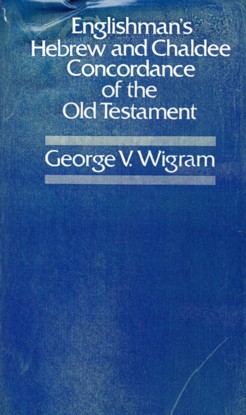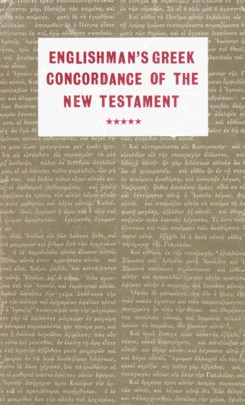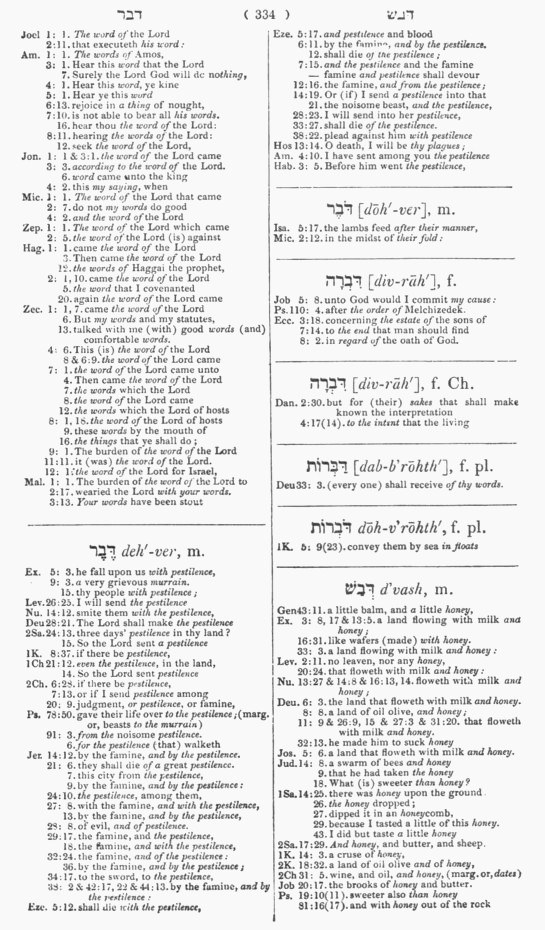|
Notice the word dehver and the list of verses in the Old Testament where dehver occurs (and its translation in the King James Bible). We see that dehver
is translated fairly consistently as "pestilence". If we want to know
how dehver is translated in other English Bibles we would have to look
up the verses in the other translation.
Was I right that dehver occurs 49 times including "16 times together
with the word 'famine'"? Page 334 is the place to check this out.
Counting from the list confirms 49 occurrences of dehver.
To count its conjunctions with "famine" it's not enough to count these
in the Concordance because the concordance-list reduces the Bible verse
to a phrase in which "famine" might be omitted although it appears in
the full verse. Therefore we need to check all the 49 listed verses in
the Bible. The two words occur together in Jeremiah 14:12; 21:9; 27:8,
13; 29:17,18; 32:24, 36; 38:2; 42:17, 22; 44:13 and Ezekiel 5:12, 17;
6:11; 6:12; 7:15 twice; 12:16; 14:21.
That's 20 times not 16; my previous count was wrong. You might be a raw
beginner but you have just done research in Hebrew and corrected an
erroneous claim! Pat yourself on the head.
Study of this sort is often called "word studies". It may appear
tedious and boring to you. Therefore I repeat, for the most part it's
unnecessary. Most Bible translations are accurate enough, as is the
King James in translating dehver as "pestilence".
SPIRIT
I'm not aware of any doctrinal disputes between religious cults that require a study of the word dehver to settle them.
On rare occasions, however, a word study may turn up a result that exposes nearly everyone as wrong.
Consider the Hebrew word ruach pronounced "roo'agh". Ruach occurs over 370 times in the Old Testament and is most often translated "spirit" and sometimes as "wind" and "breath".
In Genesis 1:2 the majority of Bible translations have "And the Spirit of God
moved upon the face of the deep". The majority of Christian
denominations interpret "Spirit" here as the third member of the
"Triune God". Others who don't believe in the Trinity interpret
"Spirit" here as a supernatural power or force emanating from God.
However, elsewhere in the Old Testament where the words ruach
and "God" come together the phrase is translated "wind of God". The
phrase "wind of God" is a figure of speech which refers to a powerful
wind. We can confirm this by looking up ruach
in the Hebrew and Chaldee Concordance and we'll find the following
verses where "wind" and "God" occur together —
Genesis 8:1; Exodus
10:13; 15:10; Numbers 11:31; Job 26:13; Psalm 107:24-25; 135:7; 147:18;
Isaiah 17:13; Jeremiah 10:13; 49:36; 51:1; Hosea 13:15; Jonah 1:4; 4:8.
Hence ruach in Genesis 1:2
should also refer to wind. The NRSV Bible is the only translation of
dozens that I checked which here has "wind" instead of "spirit" and
says: "a wind from God swept over the face of the waters."
I noted these things in the late 1970s and came up with an amazing conclusion:
Genesis 1:2ff describes Earth, before God created, as covered in water,
without light, windswept, and without plants or animals. This
description, I concluded, matches what the impact of a giant asteroid
into an ocean would do. Such an impact is something science could, if
it took place, potentially confirm. I discussed these points the first
time in Investigator 38.
I call it "amazing" because some scientists now, in the 21st century,
postulate that asteroid impacts of such gigantic proportions as to
flood the planet did occur.
Bontemps (2013) reports on the work of geologist Grant Young. Dr Young
postulates that a large asteroid impacted an ocean 570 million years
ago and changed Earth's tilt from 54o to the present 23½o:
"The impact could have blown a large portion of the ocean into the atmosphere" and "temporarily flooded the continents..."
Sumner (2015) citing the work of geologists D.R. Lowe and G.R. Byerly writes:
Evidence from ancient
rocks suggests that asteroids slammed into our planet around 3.3
billion years
ago. The impacts would have released ... so much energy
that this heat baked the skies and boiled the oceans....
Following the impacts, air temperatures for weeks would
have exceeded 500° Celsius (932° Fahrenheit). The ocean surface
would have boiled for more than a year. Global sea levels might have
plummeted by
as much as 100 meters (333 feet)...
Lowe estimates that the massive rocks measured 50 to 100 kilometers (up to 62 miles) across...
Word studies with concordances sometimes produce exciting ideas that anticipate future science!
DOCTRINE
What about doctrine?
Can we with word studies settle doctrinal disputes or at least come to an informed conclusion?
A complicated doctrine is that of Christ's second coming. We would in this case use not the Englishman's Hebrew Concordance but the Englishman's Greek Concordance. The phrase "second coming" is not applied to Jesus in the Bible but words we can look up include:
• Apokalupsis: revelation / revealing
• Erkomai: come / coming
• Heeko: shall come; will come
• Parousia: presence / coming
We would look up the English words in the English Index section of the
Greek Concordance to get the Greek word and the Concordance-page on
which all of its occurrences in the New Testament are listed. For the
four words above the pages in my copy are 70, 301, 344 and 596. A quick
count shows that Apokalupsis occurs 18 times in the New Testament, Erkomai hundreds of times, Heeko 27 times, and Parousia 24 times.
The next part of our study of Christ's return would be to look up in an
English Bible all passages in which the four words are used of Jesus in
the future.
RELATIVE ADVANTAGES
The Hebrew and Greek concordances are expensive. Young's Concordance is cheaper and also more likely to be available in a church library.
With Young's Concordance we
could miss out on seeing whether a word is translated uniformly. For
example if we look up "coming" we find it on page 188 together with the
word Greek word "parousia" and a list of 22 occasions where the King
James Bible translates "parousia" as "coming". We would not know from
this that there's another list on page 770 consisting of two
occurrences where "parousia" is translated "presence". The Greek Concordance, however, has all 24 instances in one list.
We could, however, go to the Index-Lexicon section near the back of Young's Concordance
and look up "parousia". Here we find out that it's translated 22 times
"coming" and twice as "presence". Having found this out we can look up
both English words in the main part of the Concordance and get all 24
verses that have "parousia".
Young's Concordance can thus save us from miscounting the total
occurrences of Hebrew or Greek words, because the Index-Lexicon gives
us the total. Parousia, we have just confirmed without doing any
counting, occurs 24 times. The Hebrew word dehver, Young's Index-Lexicon says, occurs 49 times, which confirms my count (and your count if you did it). Ruach,
which I claimed above occurs over 370 times, Young's Index-Lexicon says
occurs 374 times, and tells us that it is translated in the King James
Bible as: air 1, anger 1, blast 4, breath 28, cool 1, courage 1, mind
5, quarters 1, side 6, spirit 232, tempest 1, wind 90, vain 2,
windy 1.
Erkomai, which I mentioned above under "Doctrine", occurs 638 times.
CONCLUSION
Propagandists tell you what to believe, not how to do research to
refute it if it's wrong. As regards the Bible I have shared with you
how I do research to check matters out and improve my understanding.
However, in most of my Investigator articles I'm not concerned merely to understand what the Bible says, but more-so with whether what it says is correct.
To determine the Bible's correctness is a different sort of study and
involves checking the Bible against the scientific literature — as we
did with Genesis 1:2.
REFERENCES
Bontemps, J. October 14, 2013
https://www.astrobio.net/news-exclusive/did-a-huge-impact-lead-to-the-cambrian-explosion/
Lowe, D.R. and Byerly, G.R. Geologic record of partial ocean
evaporation triggered by giant asteroid impacts,
3.29–3.23 billion
years ago. Geology, June 2015, 43 (6), 535-538. Published online May 7, 2015.
Sumner, T. May 26, 2015
https://www.sciencenewsforstudents.org/article/asteroids-boiled-young-earths-oceans
Wigram, G.V. 1903 The Englishman's Greek Concordance of the New Testament, Ninth Edition, Samuel Bagster and Sons, London
Wigram, G.V. The Englishman's Hebrew and Chaldee Concordance of the Old Testament, Fifth Edition, Samuel Bagster and Sons, London
Young, R. 1939 Analytical Concordance To The Holy Bible, Eighth Edition Revised (Reprint 1967), Lutterworth Press
https://agupubs.onlinelibrary.wiley.com/doi/full/10.1029/2009RG000308
https://astrobiology.nasa.gov/news/swri-team-finds-a-possible-solution-to-faint-young-sun-paradox-in-primordial-
asteroid-impacts/
https://royalsocietypublishing.org/doi/10.1098/rsta.2014.0381
https://www.nationalgeographic.com/science/prehistoric-world/ permian-extinction/
https://www.wired.com/2009/1/giant-asteroid-impact-could-have-stirred-entire-ocean/
https://astrobiology.nasa.gov/news/swri-team-finds-a-possible-solution-to-faint-young-sun-paradox-in-primordial-
asteroid-impacts/
https/epic.awi.de/id/eprint/961/1/Ger1997i
LETTER (Investigator 194, 2020 September)
A PANDORA'S BOX
The study on ruach (Investigator # 193) is important.
If it was
not in Gen. 1:2, would there be an issue with the word? I have to check
the other occurrences where it may be construed to be the (Holy)
Spirit. This is potentially a Pandora's box with many issues.
The
primary issue is whether we can read the New Testament teaching and
understanding of the Trinity back into the Old Testament. On the
surface I would say no, but it's a big topic, and must include the OT
understanding of the Messiah.
Good research on asteroids, etc.
Ralph Gilbert
(Theology Graduate)
|
|


